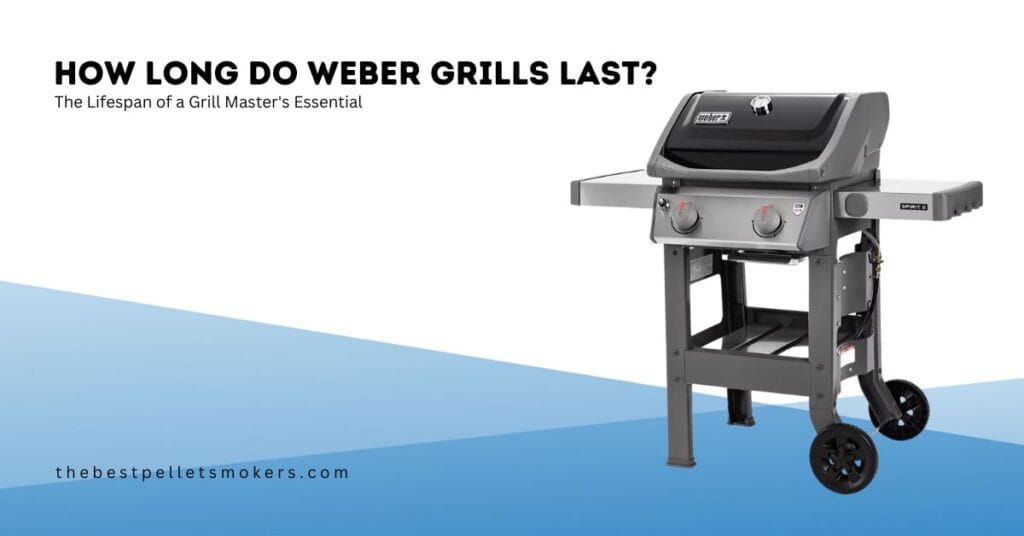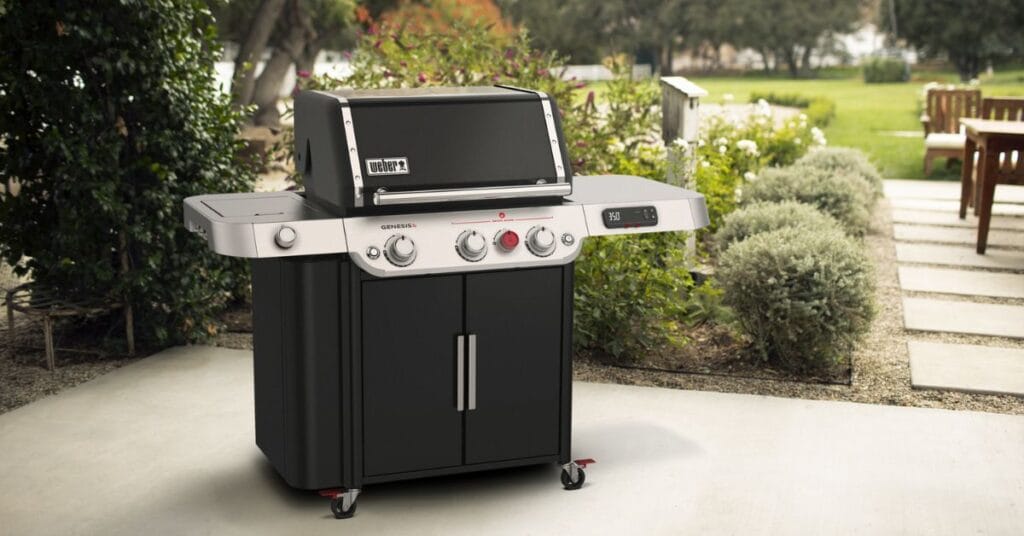Grilling aficionados know that a good barbecue isn’t just about the ingredients, the marinades, or the technique. It’s also about the grill you use. And in the world of grills, Weber has established a significant reputation for its gas grills. Many grill masters swear by them, praising their build quality, performance, and reliability. So, a common question arises, “How long do Weber gas grills last?”

Understanding the Weber Legacy
Before we delve into the longevity of Weber gas grills, it’s vital to understand the brand’s ethos. Founded in 1952, Weber started its journey when George Stephen created the first kettle grill. Today, the brand has diversified into various grill types, with gas grills being one of the most popular choices.
Materials Matter
Weber gas grills are known for their sturdy construction. They often use high-grade stainless steel, cast aluminum, and porcelain-enamel coatings. These materials are not only resistant to rust but also withstand high temperatures, ensuring that the grill remains functional for years.
However, like everything else, Weber grills aren’t immune to wear and tear. The longevity of your grill significantly depends on the materials from which it’s made. Generally, higher-end Weber models made of premium materials tend to last longer than their cheaper counterparts.
Average Lifespan of Weber Gas Grills
On average, with moderate care, a Weber gas grill can last anywhere from 10 to 15 years. Some users have even reported their grills lasting up to 20 years! However, remember, this lifespan refers to the main body of the grill. Certain components, like the burners or the grilling grates, might need replacement sooner depending on usage.
Factors Influencing the Lifespan
Several factors can influence the longevity of your Weber gas grill:
- Usage: Naturally, a grill used every weekend will wear out faster than one used once a month.
- Maintenance: Regular cleaning and proper winter storage can significantly extend your grill’s life.
- Weather conditions: If your grill is continuously exposed to harsh weather elements like intense sunlight, rain, or snow, it can degrade faster.
- Replacement parts: Weber offers replacement parts, which means instead of buying a new grill, you can replace the worn-out components.
Extending the Life of Your Weber Gas Grill
To get the most out of your grill, follow these tips:
- Regular Cleaning: After each use, clean the grates to prevent food and grease build-up. Deep clean your grill at least once or twice a season. Don’t forget to check and clean the burners, as blocked burners can affect performance and longevity.
- Protective Cover: Invest in a good-quality grill cover. It protects the grill from environmental factors and keeps it clean.
- Store in Shelter: If possible, store your grill in a sheltered location, especially during harsh winter months.
- Check for Wear and Tear: Regularly inspect your grill for any signs of wear and tear. Address minor issues before they become significant problems.
- Replace Parts: Instead of waiting for the entire grill to degrade, replace parts as needed. Regularly inspect components like burners, flavorizer bars, and ignition systems, and replace them if they’re worn out or malfunctioning.

Essential Tips for Cleaning Your Weber Grill
There’s no denying the appeal of a glistening, well-maintained Weber grill, especially when it’s the centerpiece of a summer BBQ or family gathering. Beyond the aesthetics, a clean grill ensures even cooking, prevents flare-ups, and can significantly prolong the life of your grill. So, how do you ensure your Weber stays in pristine condition? Here are some essential tips:
1. Regularly Clean the Grates:
After each grilling session, it’s crucial to give your grates a good scrub. When the grill is still warm (but not hot), use a grill brush to remove any remaining food particles. For deeper cleaning, you can also remove the grates and wash them with warm soapy water. Dry them thoroughly before placing them back.
2. Check and Clean the Burners:
Burners are the heart of your grill, and their performance can decline with accumulated grime. Ensure they are turned off and cool. Remove any debris from the burner holes with a soft brush. If you notice uneven flames during cooking, it’s a sign they might need a more thorough cleaning or replacement.
3. Empty the Grease Tray:
Many Weber grills come with a grease management system. Ensure that you regularly check and empty the grease tray. If left unchecked, it could lead to unwanted flare-ups or even become a fire hazard.
4. Clean the Flavorizer Bars:
Weber’s flavorizer bars are designed to vaporize drippings, adding that smoky flavor to your food. However, they can accumulate grease over time. Every few months, remove them and brush off any debris or build-up. If they’re heavily coated, a deeper clean with soapy water might be necessary.
5. Inspect the Ignition System:
Your grill’s ignition system ensures a smooth start every time. Check for any signs of wear or damage. If the starter isn’t producing a strong spark, it might need cleaning or replacement.
6. Exterior Shine:
The outside of your Weber grill also deserves attention. For stainless steel parts, use a specific stainless steel cleaner to avoid streaks and maintain that polished look. For porcelain-coated surfaces, warm soapy water and a soft cloth will suffice. Always dry thoroughly to prevent water spots.
7. Seasonal Deep Cleaning:
At least once a year, preferably before or after the main grilling season, give your Weber grill a deep clean. This includes dismantling the main parts and cleaning them thoroughly. It might seem tedious, but it ensures consistent performance and can add years to your grill’s life.
8. Protect Against the Elements:
When not in use, cover your grill with a high-quality grill cover. This protects against dust, rain, and other environmental factors that could diminish its appearance or functionality.
9. Use Only Weber-Recommended Cleaners:
To maintain the integrity of your grill’s materials, use only cleaning products recommended by Weber. Avoid abrasive cleaners or tools that can scratch or damage surfaces.
To Replace or Not to Replace
If you’ve had your Weber gas grill for many years and are wondering whether it’s time for a new one, consider the following:
- Are replacement parts still available for your model?
- Is the cost of repairs more than half the price of a new grill?
- Is the main body of the grill still in good condition?
If the main body is still sturdy and replacement parts are available, it might be more cost-effective to repair rather than replace.
FAQs
What materials are Weber gas grills made from?
Weber gas grills typically use a combination of high-grade stainless steel, cast aluminum, and porcelain-enamel coatings. These materials are chosen for their durability, rust resistance, and ability to handle high temperatures.
How often should I clean my Weber gas grill to extend its lifespan?
It’s recommended to clean the grates after each use to prevent food and grease build-up. Additionally, a deep clean at least once or twice a season, focusing on burners, ignition systems, and interior compartments, can help maintain its performance and longevity.
Are replacement parts readily available for Weber gas grills?
Yes, Weber offers a wide range of replacement parts for their grills, allowing users to replace worn-out components rather than buying a new grill. This approach can significantly extend the life of the grill.
Can weather conditions affect the lifespan of my Weber gas grill?
Absolutely. Constant exposure to harsh elements like intense sunlight, rain, or snow can accelerate wear and tear. It’s advisable to use a protective cover and, if possible, store the grill in a sheltered location, especially during unfavorable weather conditions.
Is it more cost-effective to repair my old Weber gas grill or buy a new one?
It depends on the condition of your grill. If the main body is still in good shape and replacement parts are available, it might be more economical to repair. However, if the cost of repairs is more than half the price of a new grill, it might be time to consider a replacement.
Do Weber gas grills come with warranties?
Yes, Weber offers warranties on its grills, but the coverage duration and terms vary depending on the model and parts. It’s always a good idea to check the specifics of the warranty for your particular model.
Will using my Weber grill in coastal areas affect its longevity?
Coastal areas, with their salty air, can be more corrosive to metal appliances. While Weber grills are built to resist rust, it’s essential to clean and maintain them more frequently in such environments to ensure a longer lifespan.
Conclusion
Weber gas grills have earned their reputation for durability and performance. With a general lifespan of 10-15 years and the possibility of lasting even longer with proper care, they offer good value for money. Remember, regular maintenance, protection from the elements, and timely replacements can ensure that you get to enjoy delicious barbecues for many years to come. So, the next time you fire up your Weber, know that with a little love and care, it will serve you well for years, if not decades!